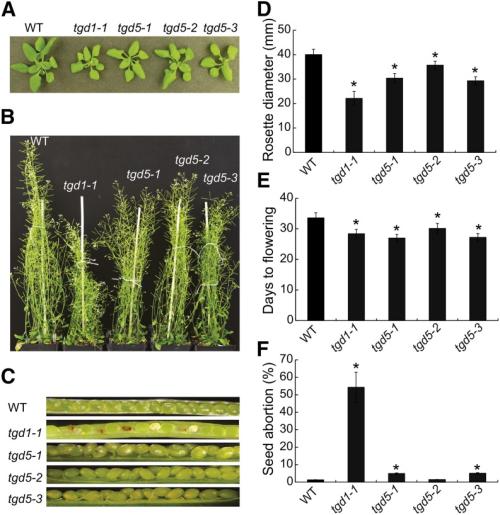Technologies Available for License
Category: energy
2013-036: Enhanced Plant Oil Accumulation through TGD5 Gene Mutation
Invention: 2013-036
Patent Status: U.S. Patent Number 9,850,291 was issued on December 26, 2017
For technical and licensing related questions, email tcp@bnl.gov.
Summary

Figure: Growth and Developmental Phenotypes of tgd5 Mutants.
Plant oil in the form of triacylglycerols (TAGs) is a major storage compound used as sustainable feedstock for biofuel production. However, the competition between food and biofuel production presents a significant challenge in meeting the growing energy demands without compromising food security. Additionally, conventional biomass has a lower energy density that reduces the efficiency of bioelectricity generation and synthetic fuel production. To provide a solution to these issue, BNL researchers invented a novel gene encoding the transporter protein trigalactosyldiacylglycerol-5 (TGD5), along with its mutations, showed a significant enhancement in TAG production and its retention in plant vegetative tissue.
Description
This invention revolves around the discovery and manipulation of a novel transporter gene, TGD5, identified through forward genetic screening in model plant Arabidopsis. TGD5 encodes a small glycine-rich protein, and its inactivation in plants leads to a significant increase in fatty acid synthesis. When TGD5 is knocked out, plants showed a 3-fold increase in fatty acid synthesis rates, without negatively affecting total lipid content or plant viability. By coexpressing the phospholipid acyltransferase (PDAT) and oleosin genes in the TGD5-deficient background, the accumulation of TAG in vegetative tissues such as leaves and stems is drastically enhanced, reaching up to 8.5% of dry weight in leaves and 3.1% in stems. Importantly, this genetic modification does not hinder plant growth or seed germination.
Benefits
Enhances oil accumulation in non-seed parts of plants, providing a larger and more sustainable source of biofuel.
Applications and Industries
The technology can be applied to various bioenergy crops, including high yield biomass crops (e.g., Miscanthus), to significantly boost their oil yield, supporting the development of next-generation bioenergy sources.
Journal Publication & Intellectual Property
Contacts
-

Poornima Upadhya
Manager Technology Transfer & Commercialization
Technology Commercialization
(631) 344-4711, pupadhya@bnl.gov
-

Avijit Sen
IP Licensing & Commercialization
Technology Commercialization
(631) 344-3752, asen@bnl.gov




